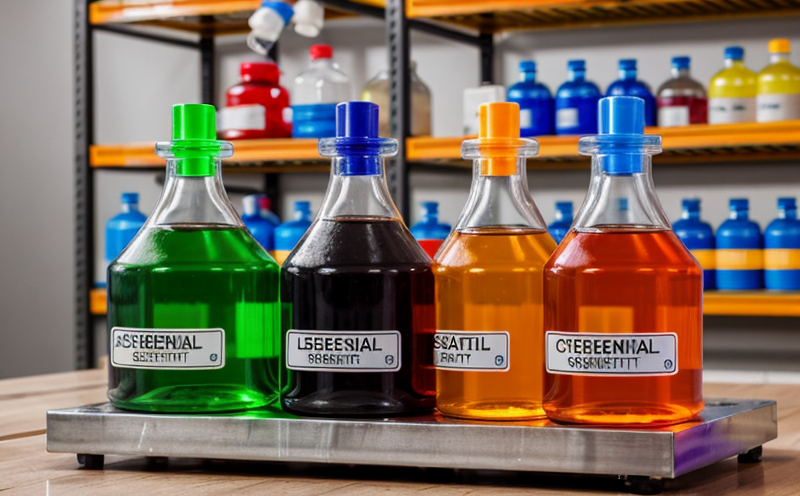Carcinogenicity Screening of Consumer Products
The process of carcinogenicity screening in consumer products is critical to ensuring that items we use daily do not contain substances that could pose a risk to human health. This service focuses on identifying potential cancer-causing agents within the chemical composition of various consumer goods, from textiles and electronics to household cleaners and toys.
Consumer safety regulations worldwide mandate rigorous testing for carcinogenic compounds in products intended for contact with skin or ingestion, as well as those that may emit harmful vapors. The primary goal is to prevent exposure to substances classified by authoritative bodies such as the International Agency for Research on Cancer (IARC) and the European Union’s REACH regulations.
Our laboratory employs advanced analytical techniques including high-performance liquid chromatography (HPLC), gas chromatography-mass spectrometry (GC-MS), and ultra-high performance supercritical fluid chromatography (UHPSFC) to detect trace levels of potential carcinogens. Specimens undergo thorough preparation, extraction, and purification steps tailored to the specific product type.
For textiles, we use methods like Soxhlet extraction followed by derivatization for gas chromatography analysis. In electronics, we employ Fourier-transform infrared spectroscopy (FTIR) and X-ray fluorescence (XRF). For household cleaners, liquid chromatography-tandem mass spectrometry (LC-MS/MS) is used to screen for volatile organic compounds.
The testing process adheres strictly to international standards such as ISO 18042:2015 for textiles and IEC 62397 for electrical products. Acceptance criteria are based on permissible limits set by regulatory bodies, ensuring that any product passing our tests is compliant with global health and safety requirements.
Our laboratory also offers comprehensive reporting tailored to the needs of quality managers and compliance officers. Reports include detailed analytical results, potential risks identified, and recommendations for eliminating or reducing exposure to harmful substances. This information is crucial for R&D engineers in developing safer products and for procurement teams in sourcing materials free from hazardous chemicals.
The process begins with a comprehensive initial consultation where we discuss the specific requirements of each product type. Our team then prepares detailed protocols that include specimen preparation, extraction methods, and analytical techniques to ensure accurate detection of potential carcinogens. Once testing is complete, our experts provide a detailed report along with suggestions for mitigation strategies.
By partnering with us, companies can not only comply with stringent regulatory requirements but also enhance their reputation by demonstrating a commitment to consumer safety. This proactive approach helps mitigate risks associated with product recalls and legal actions stemming from non-compliance.
Industry Applications
The application of carcinogenicity screening extends across multiple sectors, including textiles, electronics, cosmetics, and household products. In the textile industry, this service is essential for ensuring that fabrics used in clothing do not contain formaldehyde or other known carcinogens. For electronic devices, it helps verify compliance with restrictions on substances like lead, cadmium, and hexavalent chromium.
In cosmetics and personal care products, our laboratory can screen for ingredients such as benzene derivatives and nitrosamines that are classified as potential carcinogens by regulatory authorities. Household cleaning products require similar scrutiny to ensure they do not contain volatile organic compounds (VOCs) or other hazardous substances.
Our expertise in this area allows us to provide tailored solutions for a wide range of industries, ensuring that each product is safe for its intended use. By leveraging our advanced analytical techniques and adherence to international standards, we offer peace of mind for manufacturers who value both regulatory compliance and consumer safety.
Quality and Reliability Assurance
The reliability and accuracy of carcinogenicity screening are paramount in ensuring the safety of consumer products. Our laboratory employs a rigorous quality assurance process that includes method validation, proficiency testing, and internal audits to maintain the highest standards.
Method validation ensures that our analytical techniques produce reliable and reproducible results under controlled conditions. This involves calibrating instruments using certified reference materials and conducting blank tests to minimize background interference. Proficiency testing is conducted by participating in external comparison exercises where samples are sent to other accredited laboratories for analysis, ensuring consistency across different facilities.
Internal audits are performed regularly to assess compliance with standard operating procedures (SOPs) and identify areas for improvement. Our team of experts stays updated on the latest research and regulatory changes to ensure that our methods remain current and effective.
The use of advanced analytical techniques such as UHPSFC and LC-MS/MS allows us to detect even trace amounts of potential carcinogens, providing a high degree of confidence in our results. By maintaining strict quality control measures throughout the testing process, we can provide reliable data that meets or exceeds regulatory requirements.
Our commitment to quality is reflected not only in the accuracy and precision of our analytical methods but also in the thoroughness of our reporting. Each report includes a detailed description of the specimen preparation, extraction techniques used, and the specific analytical methods employed. This comprehensive approach ensures transparency and allows for easy verification by regulatory bodies.
Customer Impact and Satisfaction
The impact of carcinogenicity screening on customer satisfaction is significant. By ensuring that products do not contain harmful substances, we help protect the health and well-being of consumers worldwide. This proactive approach to product safety enhances brand reputation and fosters trust among customers.
Our laboratory’s services are highly valued by quality managers and compliance officers who rely on our expertise to stay ahead of regulatory changes. For R&D engineers, this service provides critical data that can inform the development of safer products. Procurement teams benefit from knowing they have access to materials free from hazardous chemicals.
The peace of mind provided by compliant products leads to increased customer loyalty and positive feedback. Companies that invest in carcinogenicity screening demonstrate a commitment to consumer safety, which is increasingly important as regulations become more stringent globally.
Our laboratory’s reputation for reliability and accuracy ensures that customers can trust the results they receive. By partnering with us, companies can focus on innovation while knowing their products are rigorously tested for compliance and safety.





